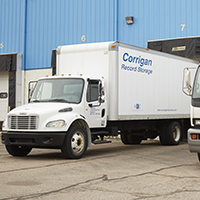Did you know there is a difference between records and documents? If you saw a physical stack of documents next to a physical stack of records, you might not see one. As far as appearances go, there are few distinctions at first glance, but the moment you dig deeper and start investigating the context of the information, it’s actually pretty simple to determine the difference between records and documents.
Documents

The Merriam-Webster dictionary defines a document as “an original or official paper relied on as the basis, proof, or support of something” or “something (as a photograph or a recording) that serves as evidence or proof”. Though this definition may lead you to believe that all documents must pertain to or act as evidence or proof in some type of official or legal proceeding, documents are in most cases not records. In fact, because documents are considered editable in the sense that their purpose is to be edited and shared, they do not need to adhere to specific government, industry, or other supervisory standards and regulations. The most important things to consider when managing documents are currency, legibility, accessibility, and distribution. Documents are designed to allow the easy exchange of information and ideas through a flexible format. Some examples of documents you might find around your office include internal audit schedules, quality policy, procedural instructions, and more.
Records

Unlike documents, records are always finalized official documents. Because official records can contain highly sensitive or other personally identifiable information (PII) such as dates, names, conversations, and more, records must be retained in accordance with specific industry, state, and federal standards, laws, and regulations. Records cannot be changed or in any way recreated, meaning you should always have access to digital and hard copies, or some other form of storage to preserve their longevity. When it comes to managing records, the most important thing to consider after the obvious security and accessibility considerations is making sure you stay compliant. Because they are used primarily for legal purposes or other rare occasions, offsite and other long-term storage solutions are most effective for retaining records. Some examples of records may include employment contracts, invoices, payroll and personal records, patient files, financial statements, and more.
When it comes to securing your documents and records, the differences hardly matter. Find an expert document management service provider, like Corrigan Record Storage, to help you formulate a plan to protect your documents and records today. Corrigan Record Storage offers countless information management services, meant to help protect what matter most to you. Please call 248.344.9185 or 1.800.944.7716, or complete the contact form in the sidebar to learn more about all of our convenient, secure and affordable services provided only by Corrigan Record Storage.



